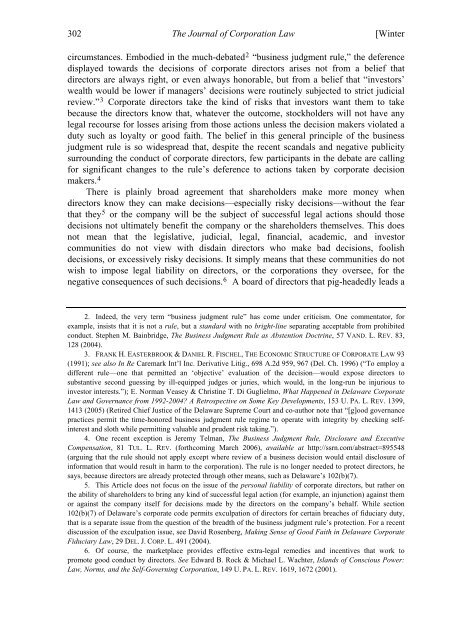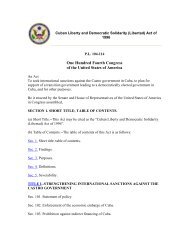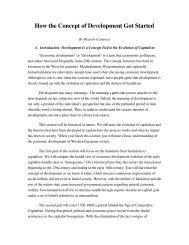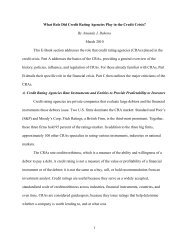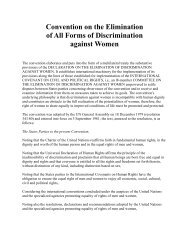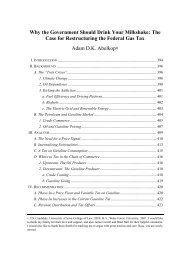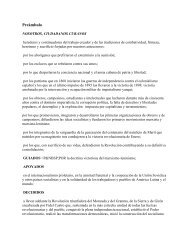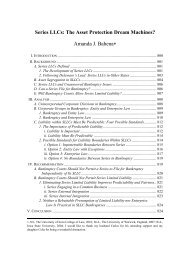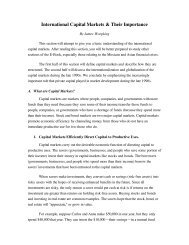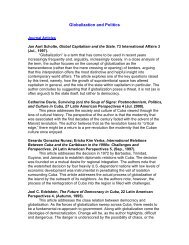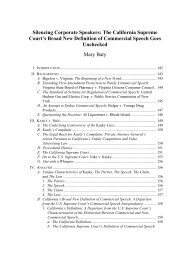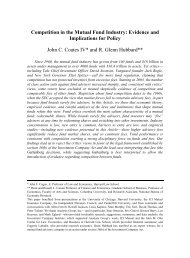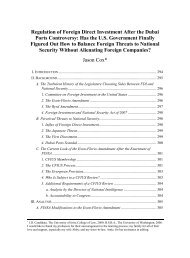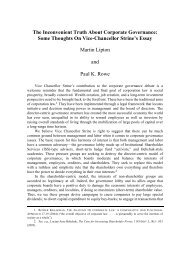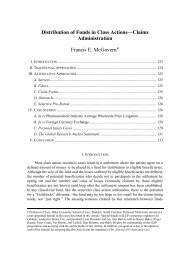Galactic Stupidity and the Business Judgment Rule - College of Law
Galactic Stupidity and the Business Judgment Rule - College of Law
Galactic Stupidity and the Business Judgment Rule - College of Law
Create successful ePaper yourself
Turn your PDF publications into a flip-book with our unique Google optimized e-Paper software.
302 The Journal <strong>of</strong> Corporation <strong>Law</strong> [Winter<br />
circumstances. Embodied in <strong>the</strong> much-debated 2 “business judgment rule,” <strong>the</strong> deference<br />
displayed towards <strong>the</strong> decisions <strong>of</strong> corporate directors arises not from a belief that<br />
directors are always right, or even always honorable, but from a belief that “investors’<br />
wealth would be lower if managers’ decisions were routinely subjected to strict judicial<br />
review.” 3 Corporate directors take <strong>the</strong> kind <strong>of</strong> risks that investors want <strong>the</strong>m to take<br />
because <strong>the</strong> directors know that, whatever <strong>the</strong> outcome, stockholders will not have any<br />
legal recourse for losses arising from those actions unless <strong>the</strong> decision makers violated a<br />
duty such as loyalty or good faith. The belief in this general principle <strong>of</strong> <strong>the</strong> business<br />
judgment rule is so widespread that, despite <strong>the</strong> recent sc<strong>and</strong>als <strong>and</strong> negative publicity<br />
surrounding <strong>the</strong> conduct <strong>of</strong> corporate directors, few participants in <strong>the</strong> debate are calling<br />
for significant changes to <strong>the</strong> rule’s deference to actions taken by corporate decision<br />
makers. 4<br />
There is plainly broad agreement that shareholders make more money when<br />
directors know <strong>the</strong>y can make decisions—especially risky decisions—without <strong>the</strong> fear<br />
that <strong>the</strong>y 5 or <strong>the</strong> company will be <strong>the</strong> subject <strong>of</strong> successful legal actions should those<br />
decisions not ultimately benefit <strong>the</strong> company or <strong>the</strong> shareholders <strong>the</strong>mselves. This does<br />
not mean that <strong>the</strong> legislative, judicial, legal, financial, academic, <strong>and</strong> investor<br />
communities do not view with disdain directors who make bad decisions, foolish<br />
decisions, or excessively risky decisions. It simply means that <strong>the</strong>se communities do not<br />
wish to impose legal liability on directors, or <strong>the</strong> corporations <strong>the</strong>y oversee, for <strong>the</strong><br />
negative consequences <strong>of</strong> such decisions. 6 A board <strong>of</strong> directors that pig-headedly leads a<br />
2. Indeed, <strong>the</strong> very term “business judgment rule” has come under criticism. One commentator, for<br />
example, insists that it is not a rule, but a st<strong>and</strong>ard with no bright-line separating acceptable from prohibited<br />
conduct. Stephen M. Bainbridge, The <strong>Business</strong> <strong>Judgment</strong> <strong>Rule</strong> as Abstention Doctrine, 57 VAND. L. REV. 83,<br />
128 (2004).<br />
3. FRANK H. EASTERBROOK & DANIEL R. FISCHEL, THE ECONOMIC STRUCTURE OF CORPORATE LAW 93<br />
(1991); see also In Re Caremark Int’l Inc. Derivative Litig., 698 A.2d 959, 967 (Del. Ch. 1996) (“To employ a<br />
different rule—one that permitted an ‘objective’ evaluation <strong>of</strong> <strong>the</strong> decision—would expose directors to<br />
substantive second guessing by ill-equipped judges or juries, which would, in <strong>the</strong> long-run be injurious to<br />
investor interests.”); E. Norman Veasey & Christine T. Di Guglielmo, What Happened in Delaware Corporate<br />
<strong>Law</strong> <strong>and</strong> Governance from 1992-2004? A Retrospective on Some Key Developments, 153 U. PA. L. REV. 1399,<br />
1413 (2005) (Retired Chief Justice <strong>of</strong> <strong>the</strong> Delaware Supreme Court <strong>and</strong> co-author note that “[g]ood governance<br />
practices permit <strong>the</strong> time-honored business judgment rule regime to operate with integrity by checking selfinterest<br />
<strong>and</strong> sloth while permitting valuable <strong>and</strong> prudent risk taking.”).<br />
4. One recent exception is Jeremy Telman, The <strong>Business</strong> <strong>Judgment</strong> <strong>Rule</strong>, Disclosure <strong>and</strong> Executive<br />
Compensation, 81 TUL. L. REV. (forthcoming March 2006), available at http://ssrn.com/abstract=895548<br />
(arguing that <strong>the</strong> rule should not apply except where review <strong>of</strong> a business decision would entail disclosure <strong>of</strong><br />
information that would result in harm to <strong>the</strong> corporation). The rule is no longer needed to protect directors, he<br />
says, because directors are already protected through o<strong>the</strong>r means, such as Delaware’s 102(b)(7).<br />
5. This Article does not focus on <strong>the</strong> issue <strong>of</strong> <strong>the</strong> personal liability <strong>of</strong> corporate directors, but ra<strong>the</strong>r on<br />
<strong>the</strong> ability <strong>of</strong> shareholders to bring any kind <strong>of</strong> successful legal action (for example, an injunction) against <strong>the</strong>m<br />
or against <strong>the</strong> company itself for decisions made by <strong>the</strong> directors on <strong>the</strong> company’s behalf. While section<br />
102(b)(7) <strong>of</strong> Delaware’s corporate code permits exculpation <strong>of</strong> directors for certain breaches <strong>of</strong> fiduciary duty,<br />
that is a separate issue from <strong>the</strong> question <strong>of</strong> <strong>the</strong> breadth <strong>of</strong> <strong>the</strong> business judgment rule’s protection. For a recent<br />
discussion <strong>of</strong> <strong>the</strong> exculpation issue, see David Rosenberg, Making Sense <strong>of</strong> Good Faith in Delaware Corporate<br />
Fiduciary <strong>Law</strong>, 29 DEL. J. CORP. L. 491 (2004).<br />
6. Of course, <strong>the</strong> marketplace provides effective extra-legal remedies <strong>and</strong> incentives that work to<br />
promote good conduct by directors. See Edward B. Rock & Michael L. Wachter, Isl<strong>and</strong>s <strong>of</strong> Conscious Power:<br />
<strong>Law</strong>, Norms, <strong>and</strong> <strong>the</strong> Self-Governing Corporation, 149 U. PA. L. REV. 1619, 1672 (2001).


